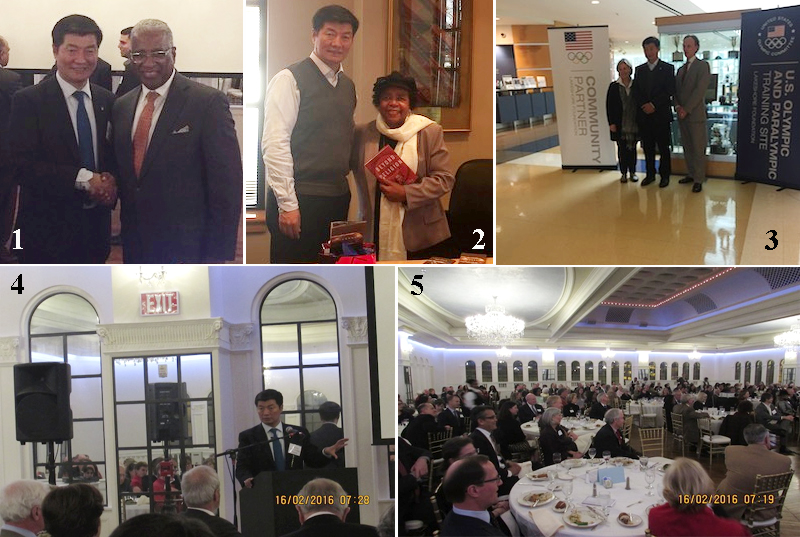 Birmingham, US — Tibetan political leader Sikyong Dr Lobsang Sangay who is currently in the US for a series of speaking engagements, said that "Tibet will be one of the greatest chapters of the 21st century under the spiritual guidance of His Holiness the Dalai Lama."
Birmingham, US — Tibetan political leader Sikyong Dr Lobsang Sangay who is currently in the US for a series of speaking engagements, said that "Tibet will be one of the greatest chapters of the 21st century under the spiritual guidance of His Holiness the Dalai Lama."
Birmingham, a city in the US state of Alabama, shares symbolic resonance with the Tibetan struggle, as it was the center of the non-violent civil rights movement for African Americans in the 1960's. Dr Sangay visited the city from February 15-17. His Holiness the Dalai Lama also visited the city in 2014.
His first stop in the city was the Foreign Relations Committee where he met the city's Mayor Mr William A Bell Sr. and delivered a talk on Tibet's significance to the world. The talk was organised by Birmingham committee of international affairs. Ms Cathy Jones, President of Sloss Real Estate Co. and an ardent Tibet supporter, gave the introductory remarks.
"I have come here today, partly to connect with the spirit of the civil rights movement and partly to reflect, revisit and embrace the symbolism that the city of Birmingham represents," Sikyong told the gathering of luminaries including Chairman Andrew Young, top business executives, authors, politicians, activists and academics of the city.
He paid tribute to the leaders of the civil rights movement for their commitment to non-violence and said that the success of the civil rights movement shaped the success of the South African people in ending the Apartheid regime. He also added that the successes of these non-violent movements inspire Tibetans in strengthening their resolve for a non-violent resistance to the Chinese government's repression.
Eloquently quoting the iconic speech, 'I Have a Dream' by Dr Martin Luther King, Sikyong said that, just like the African-American people in the 1960's, Tibetan people also have a tall metaphorical mountain to climb. However, he expressed optimism that Tibet will be one of the greatest chapters of the 21st century under the spiritual guidance of His Holiness the Dalai Lama and the political leadership of the Central Tibetan Administration.
Drawing on this optimism, Sikyong thanked the gathering for their interest and support for Tibet and said, "even a simple gesture of support from the international community evolves into a strong message of hope for the Tibetans inside Tibet who continue to suffer economic marginalisation, social discrimination, political repression, environmental destruction and cultural assimilation under the Chinese government."
Sikyong also spoke about Tibet's geo-political significance as the buffer between the two most populous countries of the world namely, India and China. "For centuries, Tibet has effectively served as a buffer between India and China. However, it all changed after the invasion of Tibet which brought these two countries face-to-face, resulting in a serious threat to India's borders," he proclaimed.
"This confrontation has further led to a military buildup and a rapidly accelerating arms race along the Indo-Tibetan border according to CIA reports," he added.
He then underlined Tibet's significance from an environmental perspective, highlighting the huge reserves of ice found on the Tibetan plateau. "Tibet is the source of Asia's major rivers and is home to the third highest reserve of ice after the two poles," Sikyong said.
"The only difference between Tibet and the two poles is that, while the water from the melting of ice on the poles go into the ocean, the melting of Tibet's glaciers feed the rivers on which more than a billion people depend for livelihood," Sikyong explained.
"What is even more alarming," Sikyong added, "is that almost 50% of the ice reserves and glaciers on the Himalayan and Tibetan plateau has already melted in the last few decades. And as far as NASA is concerned, by 2050, another 50% of the Tibetan glaciers will melt." This could result in severe freshwater crisis, he noted.
Sikyong further spoke about the Middle Way Approach explaining that it is the most realistic solution to resolve the Tibet issue, given its win-win proposition and strong adherence to dialogue and non-violence.
The three-day visit of the Tibetan political leader to Birmingham also included visits to the Civil Rights Institute, the Birmingham Museum of Art, and meetings with local dignitaries.
Dr Sangay, who is a legal scholar from Harvard Law School, was also invited to take an honorary class on human rights at the University of Alabama. The class was attended by law students who posed questions related to the issue of degrading human rights in Tibet.
Before concluding his visit to the city, Sikyong also paid a visit to the Lakeshore Foundation, a non-profit organisation helping those with spinal cord injuries and cerebral palsy. Sikyong met the Director of the foundation and discussed physical disabilities in the Tibetan society and, possible tie-ups and assistance in the future.


![Tibet has a rich history as a sovereign nation until the 1950s when it was invaded by China. [Photo: File]](/images/stories/Pics-2024/March/Tibet-Nation-1940s.jpg#joomlaImage://local-images/stories/Pics-2024/March/Tibet-Nation-1940s.jpg?width=1489&height=878)















